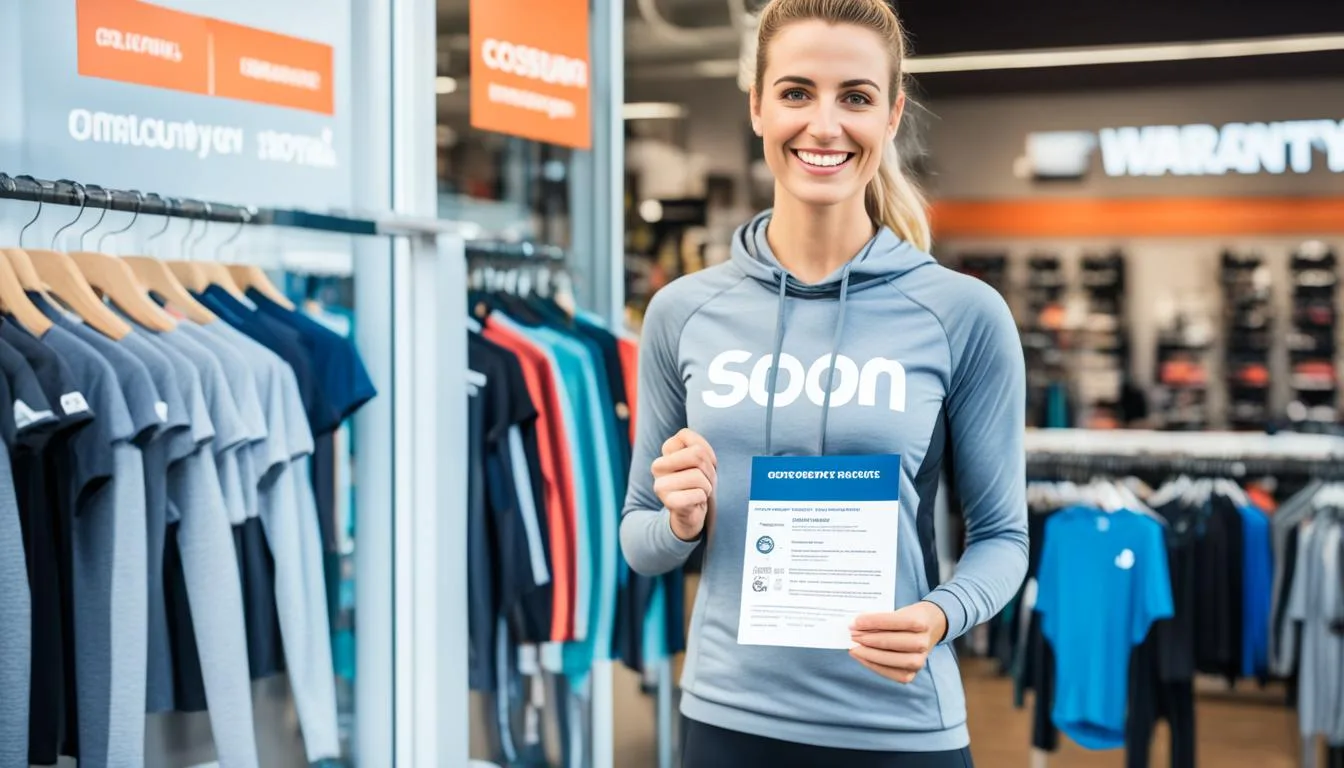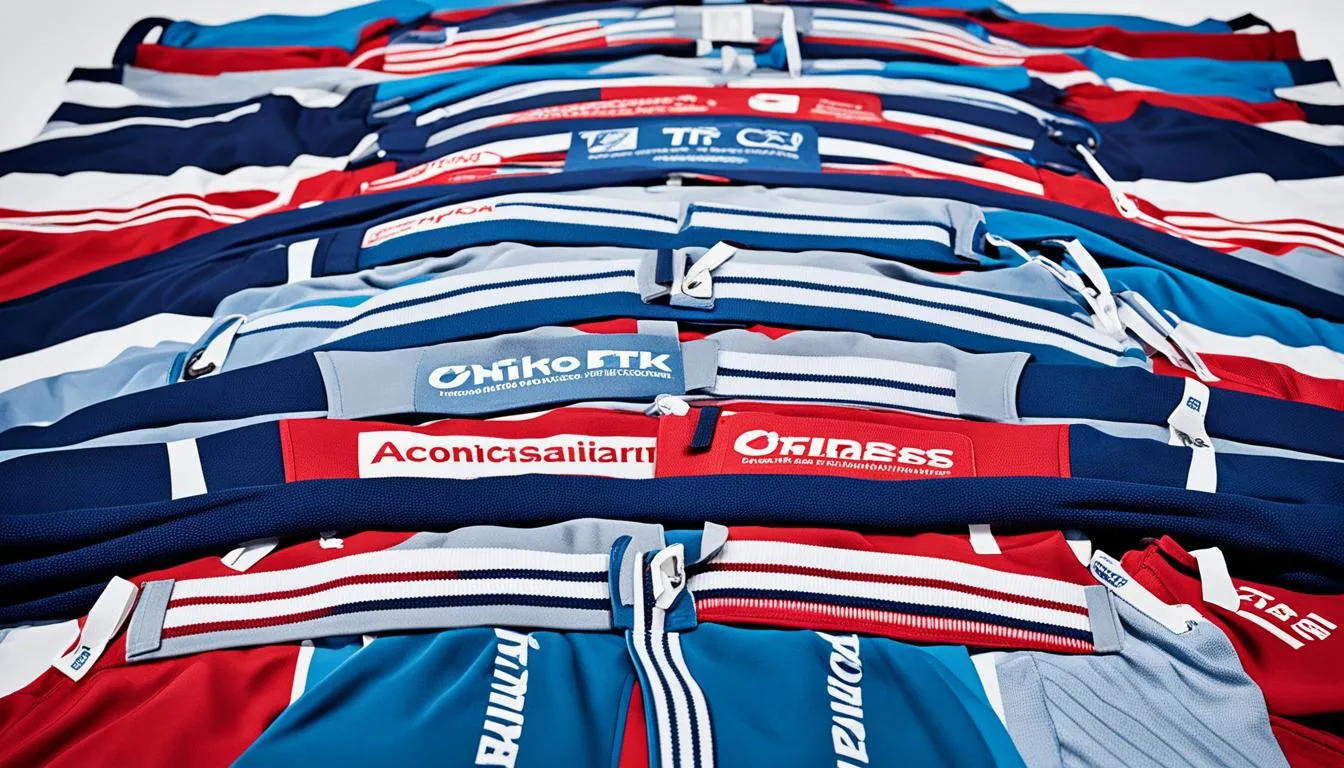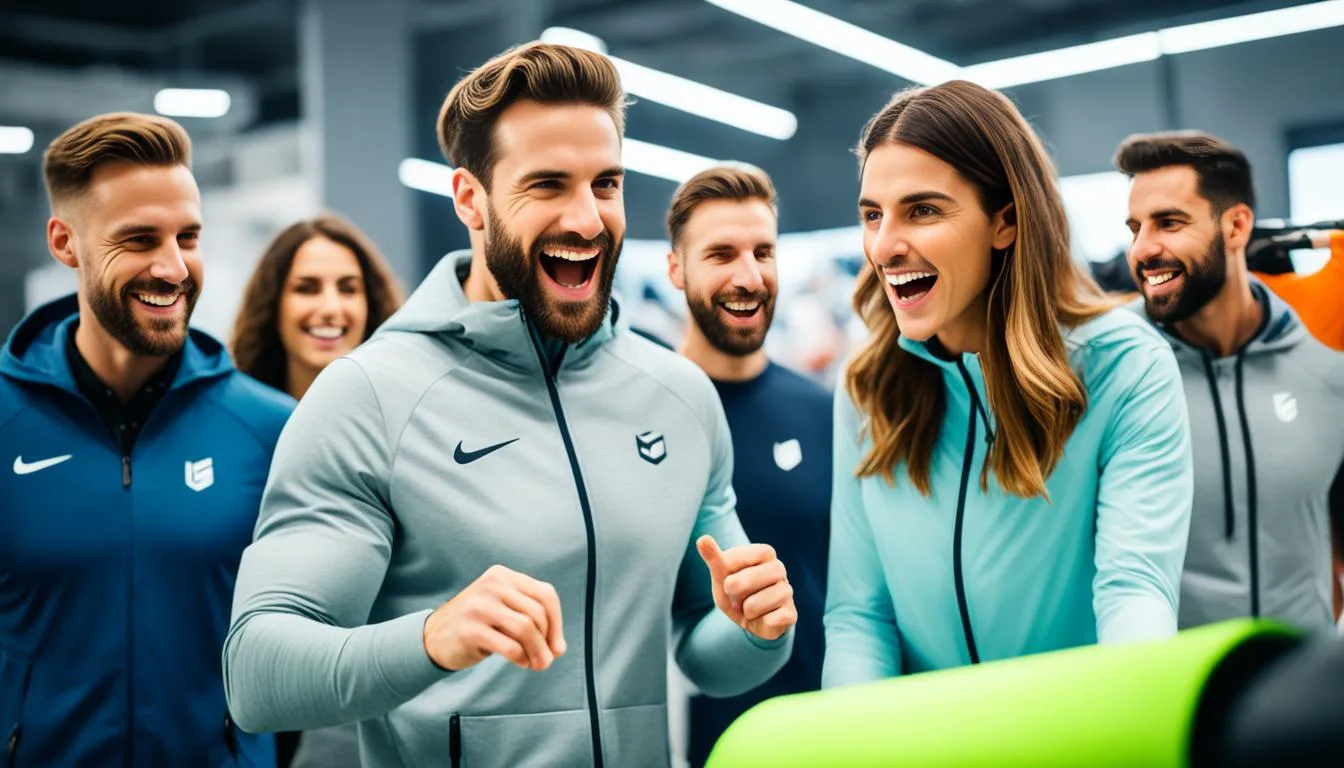Strategies for Partnering with Ethical Suppliers in Sportswear
Connect With Us Today
Consider us for your next production run. Why wait? Send us your questions here.
As we step into the evolving world of sportswear, our commitment grows stronger. We aim to work with suppliers who are on the same page ethically. Transparency is key in these partnerships, ensuring integrity in every step. Together, we’re working to change the industry for the better. We want every sports product to not only help athletes but also support the people and places that make them.
Key Takeaways
- Identifying and partnering with ethical sportswear suppliers is crucial for industry sustainability.
- Collaboration with suppliers is based on shared values of transparency and ethical standards.
- Adopting conscious sourcing strategies is essential to our long-term success and reputation.
- Engagement with suppliers who comply with legislation like the U.S. Foreign Corrupt Practices Act ensures legal integrity across our operations.
- Maintaining diligent and accurate records reflects our commitment to ethical business practices.
- Encouraging a culture of compliance and reporting fosters an environment of trust and improvement.
- Inclusivity and environmental responsibility are key traits we seek from our international brand suppliers.
The Significance of Ethical Supplier Relationships in the Sportswear Industry
In the sportswear industry, caring about ethical supplier relationships is crucial. It’s not just for a good image; it’s key for responsible business. Big names like Adidas and Nike know this well. They’ve made it a major part of how they operate, showing how crucial sustainable partners are for success.
Adidas is a prime example of building ethical supplier relationships. 65% of its makers have been with them for over ten years, 35% for more than twenty. This shows more than loyalty. It shows Adidas’s dedication to strong, reliable, and sustainable industry connections.
Understanding the Value of Strategic Alliances
Creating ethical and strategic supplier relationships can change our industry. It boosts innovation and competitiveness globally. Adidas works with over 400 factories in about 45 countries, highlighting their commitment to diversity and ethical practices. Their strict checks ensure suppliers meet their high standards, proving the importance of transparent and responsible practices.
Case Study: Apple and TSMC’s Groundbreaking Partnership
Lessons also come from outside our sector. Apple and TSMC’s partnership shows how working together on technology can keep a company on top. Sportswear brands can learn from this to keep their competitive advantage.
Adidas: A Role Model for Ethical Sourcing and Supplier Collaboration
Adidas leads the way in ethical sourcing and working with suppliers. They focus on performance and ratings to keep improving their industry relations. Their efforts strengthen their brand and make the sportswear market more credible and transparent.
For sportswear brands, being successful and financially sound is crucial. But, we must remember the important connection between a brand and its suppliers. Nike, with a 30% market share, shows how these relationships can drive growth and digital innovation. Starting from $2 million in sales to buying Converse increased their sales massively. Nike’s digital sales grew significantly after buying Datalogue, showing how ethical partnerships can lead to digital growth.
We strongly believe in the power of ethical relationships and responsible supply chains in sportswear. Our goal is clear: to push the industry forward by promoting sustainable and transparent sourcing partnerships.
Core Principles of Strategic Supplier Partnerships
Working within the ethical fashion industry means embracing key principles. And in doing so, we prioritize three things: trust, transparency, and shared goals. We create strong bonds with eco-friendly sportswear makers and others. Together, we aim for a bright and prosperous future.
Building Trust and Transparency with Suppliers
Trust and open communication are the foundations of our partnerships in the ethical fashion world. We admire giants like Unilever for their success in encouraging honest talks with suppliers. Such openness boosts performance, sparks innovation, and keeps us on the ethical path. In all our dealings, we stress the importance of being honest and clear, committing to uphold these values in every interaction.
Fostering Long-Term Collaborative Goals
Our goals with partners are not just words on paper but shared visions for the future. By syncing our plans with those of our partners, like eco-friendly sportswear manufacturers, we aim for a lasting bond. We all benefit from this arrangement, enjoying cost savings and improved product quality in the long run.
Key Characteristics of Strategic Alliances
The partnerships we form with our suppliers are more than simple transactions; they’re deep, strategic connections. These alliances help us grow and improve, thanks to efficient knowledge and resource sharing. We’re committed to being eco-friendly and continuously innovating together.
| Year | Sustainably Sourced Volumes | Supply Chain Initiatives |
|---|---|---|
| 2013 | 8% | Foundational sustainability actions established |
| Previous Year | 54% | Diverse supplier financing and agile market response |
| On-going | N/A | Remote audits and adherence to updated Supply Chain Standards |
Take Amazon as an example of excellence in supply chain initiatives. They are leaders in protecting workers’ rights and the environment. Not only do they perform thorough risk assessments, but they also fix issues actively. They include human rights considerations in every business choice they make.
Assessing Supplier Ethics: Criteria and Best Practices
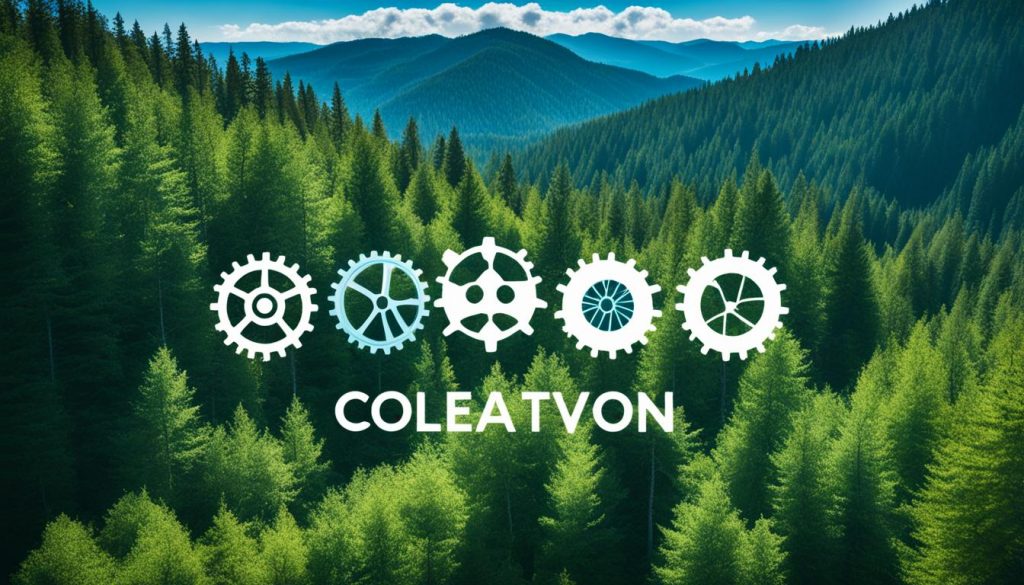
In the sportswear industry, the ethical sportswear suppliers we choose are crucial. They must reflect our brand’s integrity and responsibility. We vet our suppliers carefully, making sure they meet our high standards. This includes checking on labor conditions, environmental policies, and product quality.
Companies like Adidas show us that success and ethics go hand in hand. Ethical supply chains are not just about meeting legal or moral standards. They are a strategic asset that fosters innovation and trust. This helps us stand out in the competitive sportswear market.
What does it take to be the best in auditing suppliers? We look for suppliers committed to improving and being transparent. They must welcome regular checks and communicate openly. This keeps them in line with our goals for sustainability and responsibility.
| Criteria | Best Practice |
|---|---|
| Labor Conditions | Regular audits to ensure safe, fair, and respectful working environments |
| Environmental Impact | Verification of sustainable processes and resource usage |
| Product Quality | Rigorous testing to confirm high standards are consistently met |
| Educational Emphasis | Engaging suppliers with educational programs to foster a deeper understanding of ethical practices |
| Cultural and Legal Compliance | Ensuring supplier practices are respectful of local traditions and in strict compliance with legal requirements |
We’re committed to working with the right ethical sportswear suppliers. But it’s more than just partnering with them. It’s about helping them to develop responsible practices too. A successful relationship with suppliers relies on shared excellence and a strong ethical foundation.
We believe in prioritizing education and collaboration, alongside high ethical standards. Such an approach helps us not just meet, but exceed industry codes. Together, we aim to build a reliable, ethical supply chain. It’s the key to our leadership in the sportswear industry.
Facilitating Technological Advancements through Ethical Partnerships
The mix of tech and ethics in modern sportswear is creating an innovative industry. We are thrilled to see top companies team up with eco-friendly sportswear manufacturers. Their goal is to blend high performance with sustainability. By working closely with sportswear supplier collaboration, we see groundbreaking advancements.
New tech like 3D printing and automated cutting is making production greener. These methods reduce waste and make sports gear more eco-friendly. Using cloud platforms and data tools also improves how we work with suppliers. This sparks more innovation. Brands like Adidas show the strength of mixing advanced tech with ethical practices.
| Advance | Impact | Eco-Friendly Benefit |
|---|---|---|
| 3D Printing | Streamlined manufacturing | Reduction in material waste |
| Automated Cutting | Greater precision | Efficient use of fabrics |
| Cloud Computing | Real-time data sharing | Lower carbon footprint from reduced travel |
| Data Analytics | Product lifecycle insights | Strategic material utilization |
These advancements elevate the industry and change how we approach sportswear supplier collaboration. It’s not just about responding to a demand for eco-friendly sportswear manufacturers. It’s about leading the market towards ethical fashion. This sets new standards.
We’re committed to innovation. This isn’t just about meeting today’s needs. It’s about pushing boundaries. It’s thrilling to lead in this transformative time in sportswear. Each piece of clothing reflects a commitment to ethics and innovation.
Leadership and Its Impact on Supplier Relations
Our discussion on responsible supply chain practices wouldn’t be full without talking about leadership’s big role. The strength of good ethical fashion industry partnerships comes from leaders who lead by example. They have the vision and passion needed to create a culture where innovation and ethics are key every day.
Leading by Example: The Role of C-Suite Executives
In the sportswear world, top executives play a crucial role in moving forward. Their actions and orders help keep the company focused on responsible supply chain practices. They make sure the company’s goals match up with taking care of the environment and being socially responsible. This builds a strong foundation for ethical fashion industry partnerships.
Cultivating a Culture of Collaborative Innovation
We know that an environment that supports sharing ideas is dynamic. It’s about more than just following rules; it’s about setting new standards for ethical practices. By making spaces where ideas can grow, companies can greatly enhance their processes. This leads to groundbreaking innovations.
Promoting Ethical Decision-Making in Supply Chain Management
Moving a brand towards ethical choices in supply chain management keeps ethical fashion industry partnerships strong. This needs ongoing involvement and a readiness to solve problems before they grow.
| Brooks’ Traceability Approach | SLCP CAF Assessment Compliance | Engagement of Tier 2 Factories | Rating Outcome of Factories |
|---|---|---|---|
| 65% of units manufactured covered | 100% of in-scope factories assessed | 80% based on dollar spend | Varies from Satisfactory to Immediate Action |
By making accountability a central value, leaders build a future where being responsible and profitable boost each other.
Lessons Learned from Adidas: A Global Approach to Ethical Sourcing
Adidas, a leader in the sportswear market, has set high standards. They manage a wide network of ethical sportswear suppliers. By focusing on ethical sourcing and sustainability, they have changed the game. The move to close Speedfactories in Germany and Atlanta points to a new direction. Here, they aim for savings through advanced engineering, like 3D printing. This could cut down the usual 60-80 steps in shoe making to just a few.
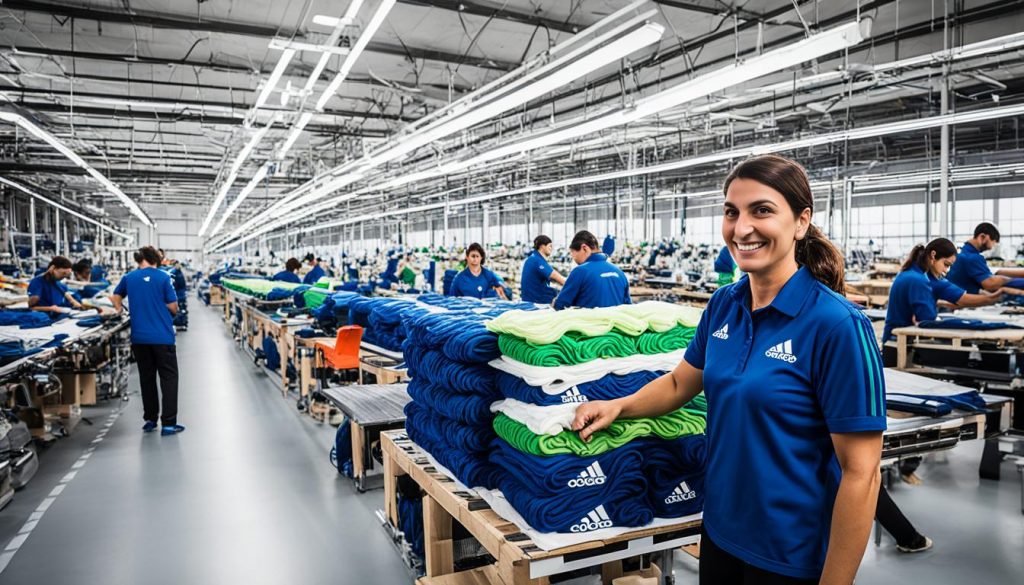
Adidas and its sustainable sourcing partners are reshaping fashion. This industry is responsible for about 8% of world greenhouse gas emissions. Working with companies like Jeanologia helps. Jeanologia operates in 60 countries and helps make a third of the world’s jeans with zero contamination.
Adidas and stores like Zalando see going green as crucial for success. They are moving to less polluting transport methods, like ships and trains. This is similar to what brands like Hugo Boss and Patagonia do. Adidas wants to lower its carbon footprint in its supply chain.
The Indian government is offering tax breaks for making things locally. This helps the economy and the planet by making supply chains shorter. By working closely with ethical sportswear suppliers and sustainable sourcing partners, we can also enjoy these perks. Our efforts contribute to global sustainability goals in a big way.
Adidas’s choices in sourcing and distribution do more than meet company goals. They set a moral direction for the whole industry towards a greener future. Their efforts in planning, reducing emissions, and combining profit with ethics are inspiring. We aim to follow their example in our supply chains. Our goal is to be as respected for our impact as those we look up to.
The Advantages of Ethical Fashion Industry Partnerships
Working with ethical suppliers in the sportswear industry brings big benefits. It’s not just about being nice; it helps businesses grow and save. Partnering with green sportswear producers means doing better business, gaining respect, and securing a strong spot in the market.
Cost Savings and Improved Profit Margins
It’s a fact – organic cotton uses only 243 litres of water for a T-shirt. That’s way less than the 2,700 litres needed for regular cotton, says WWF. This big drop in water use saves money. Also, making clothes from recycled polyester costs less in energy and water than making them from new polyester. This way, sportswear brands save cash and help the planet.
Strengthening Brand Reputation through Responsible Practices
Nowadays, what people think of your brand depends a lot on your ethical actions. Having ethical supplier relationships in the sportswear industry looks good to buyers who care about the planet and fair work. Being open about where and how clothes are made wins over customers who demand quality and ethics.
Encouraging Innovation and Quality in Sportswear Manufacturing
Using 3D printing in making clothes shows how tech and good ethics lead to new ideas. This method allows for unique designs and cuts down on waste. By avoiding waste, companies can make better eco-friendly sportswear, reducing trash in landfills.
Building good relationships with ethical suppliers sparks creativity and high quality. Companies get more done and spend less when they support fair work conditions. This way, they can offer great sportswear that’s kinder to our world.
Implementing Sustainable and Ethical Sourcing Models: Case Studies
In our quest to improve conscious sourcing strategies in sportswear, we look at inspiring examples. Hasbro stands out for its ethical business and strong community role. It’s celebrated for getting 92% of its team to participate in charity work.
To boost our conscious sourcing, we examine Hasbro’s Climate Action Plan. It aims to cut carbon emissions by 2030 and achieve net-zero by 2050. Such commitment shows the power of ethical supplier relationships in setting industry standards.
Hasbro leads with fairness, ethics, and care for the environment. Their 2021-2022 Diversity, Equity, and Inclusion Report shows their deep commitment to diversity and equality. They stand firmly for human rights, ethical sourcing, and privacy, affecting the quality of their products.
The Global Purpose Organization is key to Hasbro’s ethical operations. It covers areas like human rights and philanthropy. This group proves how strategic business practices can include conscious sourcing strategy.
Hasbro’s Chief Purpose Officer looks after the company’s impact on our planet and its communities. They ensure policies and strategies focus on Planet, Play, People, and Principles. This approach guides us as we face sustainability and ethical challenges, helping both the Earth and the sports world.
Conclusion
As we wrap up our look into the sportswear industry’s evolution, it’s clear that working with ethical suppliers in sportswear is key. This approach helps not just supply chains last but also boosts brand trust and meets what customers expect regarding ethics. Going through case studies and top methods shows a strong move: Being open and focusing on sustainability in the supply chain can give a brand an edge. It can make customers more loyal and support long-term financial health.
At the core of these changes is a commitment to ethical sportswear suppliers. Leaders like H&M Group are setting examples. They ensure fair treatment for suppliers and focus on training workers and on-time payments. These efforts show how critical sustainable partnerships are. They’re not just nice ideas; they’re necessary for a business strategy that listens to consumers. Many people, especially the young, are ready to spend more on sustainable products. This shows a big change in the market.
Moving forward, we’ll see even more focus on conscious sourcing strategies. There will be efforts to make clothes last longer and show how important sustainability is to customers. It’s important to fill the gap in information about sustainability. This helps people who want to make better buying choices. By sticking to ethical practices and raising awareness, we help customers choose sustainable options. This makes the sportswear industry more ethical overall. Looking to the future, focusing on working with good suppliers and teaching customers isn’t just a passing phase. It’s a key part of shaping what’s next for sportswear.
FAQ
What defines an ethical sportswear supplier?
How can sportswear brands collaborate effectively with suppliers?
What role do strategic alliances play in the sportswear industry?
How do Adidas exemplify ethical sourcing and collaboration?
What are the core principles of strategic supplier partnerships in sportswear?
What technologies are enabling advancements in ethical supplier collaborations?
Why is leadership important in fostering ethical supplier relationships?
What insights can be gained from Adidas’ global approach to ethical sourcing?
What are the benefits of engaging in ethical fashion industry partnerships?
How are brands like Patagonia and H&M shaping sustainable sourcing?
Source Links
- https://www.coca-colacompany.com/policies-and-practices/supplier-code-of-business-conduct
- https://goodonyou.eco/ultimate-guide-ethical-activewear/
- https://www.adidas-group.com/en/sustainability/social-impacts/supply-chain
- https://www.cascade.app/studies/how-nike-runs-the-sportswear-game
- https://www.coca-colacompany.com/media-center/ethical-and-sustainable-sourcing-during-covid-19
- https://sustainability.aboutamazon.com/human-rights
- https://www.hsbc.com/who-we-are/esg-and-responsible-business/working-with-suppliers
- https://www.accenture.com/content/dam/accenture/final/a-com-migration/pdf/pdf-63/accenture-cobe-brochure-english.pdf
- https://www.oecd.org/mena/governance/35521418.pdf
- https://global.toyota/en/sustainability/index.html
- https://www.brooksrunning.com/en_us/meet-brooks/running-responsibly/responsible-sourcing/
- https://www.supplychaindive.com/news/adidas-speedfactory-blunder-distributed-operations/571678/
- https://www.white2labelmanufacturing.com/blog/sustainable-clothing-manufacturing
- https://csr.hasbro.com/en-us/esg-html
- https://www.hmgroup.com/sustainability/leading-the-change/transparency/responsible-purchasing-practices/
- https://www.coca-colacompany.com/sustainability/sustainable-agriculture
- https://www.bain.com/insights/how-brands-can-embrace-the-sustainable-fashion-opportunity/
Latest News
How Collaboration Shapes Consumer Preferences in Sportswear
Navigating Consumer Rights and Warranties in Sportswear Sales
Artificial Intelligence in Fashion Forecasting and Trend Analysis
The Shift Towards Inclusive Sizing in Sportswear: Consumer Reactions
The Global Expansion of Luxury Sportswear Brands
From Sketch to Gym: The Design Process of Fashionable Sportswear
Understanding the Role of Trade Associations in Sportswear Compliance
How Economic Trends Influence Consumer Spending on Sportswear
Learning from Successful Global Market Entries
Best Practices for Managing Cross-Cultural Teams
Using Technology to Fight Counterfeit Fashion Products
Carbon Nanotube Fabrics for Superior Strength and Flexibility
The Growth of Fitness Tracking Apparel in Health and Wellness
Exploring the Influence of Social Proof in Sportswear Purchasing
Strategies for Managing Compliance in a Multinational Operation
Trends in Global Footwear: Performance Meets Lifestyle
The Role of Artificial Intelligence in Tracking Supply Chain Operations
Evaluating the Success of Sportswear Collaborative Projects
Evaluating the Potential of Emerging Markets
Global Shifts Towards Gender-Neutral Sportswear
Share This Article
Latest Articles


